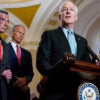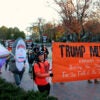On Monday, Congressmen Mike Quigley (D–IL) and Aaron Schock (R–IL), along with Senator Mark Kirk (R–IL) and more than 15 other cosponsors, reintroduced the Visa Waiver Program Enhanced Security and Reform Act. The bill would expand the Visa Waiver Program (VWP), which allows citizens of participating countries to travel in the United States for up to 90 days without having to obtain a visa. The benefits, however, aren’t just for the travelers. The program also allows the U.S. to improve ties with allies, increase national security, and boost international travel to the United States.
The proposals in the bill are nothing new. In fact, Congressman Quigley introduced the very same legislation during the 112th Congress. Regrettably, in March 2012, the bill was incorporated into the larger Jobs Originated through Launching Travel (JOLT) Act. The JOLT Act was well intentioned in trying to solve the issue of long wait times for obtaining a visa and boost international tourism to the U.S. Good intentions, however, are nothing without good policy. While JOLT would expand the VWP, it would also create misguided priority programs and specialized provisions for different kinds of travelers seeking to visit the U.S.
Not only that, but it meant Congressman Quigley’s original proposal to reform the VWP in and of itself was effectively dead.
Congress now has another chance to address the VWP expansion and address it in its own right and not in any comprehensive bill. If passed, the Visa Waiver Program Enhanced Security and Reform Act would allow the Department of Homeland Security (DHS) to employ both visa refusal rates and overstay rates as eligibility criteria. It would also reinstate the Secretary of Homeland Security’s ability to waive the 3 percent refusal rate requirement for otherwise eligible nations. These reforms are essential to ensuring that objective and reasonable standards are used to determine country admission and, more broadly, in ensuring the long awaited expansion of the program.
Since 2008, only two countries—Greece and Taiwan—have been admitted to the VWP, leaving many friends and allies—such as North Atlantic Treaty Organization (NATO) allies Croatia, Bulgaria, Poland, and Romania—waiting on the backburner.
Further expansion would strengthen ties with U.S. allies, but would also enhance U.S. security and prosperity. By providing for the pre-screening and clearance of passengers, the VWP allows the DHS and consular offices to focus their attention on other potential travelers who may pose threats to national security. Furthermore, by increasing international travel, the program would also help to create needed jobs in the tourism sector and provide investment in the U.S. economy through money spent by travelers at hotels, shops, and restaurants.
The benefits are clear. What isn’t clear is exactly what Congress is waiting for.





























